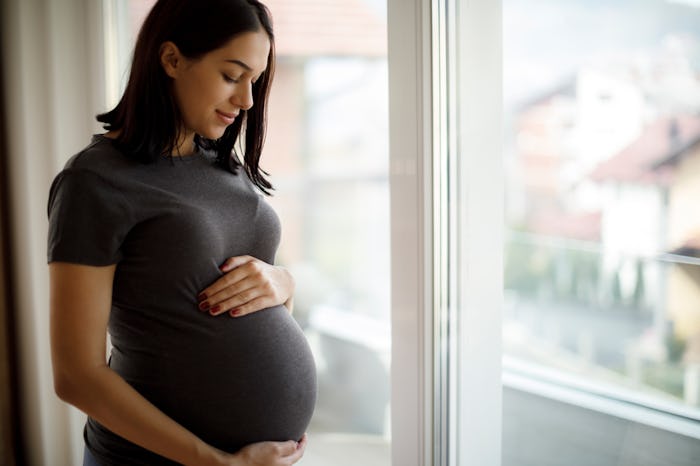Life

Can You Go Into Labor If Your Baby Hasn't Dropped Yet?
As you waddle through your final trimester, you may start getting asked whether or not the baby has dropped. If your belly seems as high as ever, don't panic or frantically start Googling "can you go into labor without dropping" because, as it turns out, you absolutely can.
Dropping "also known as lightening" is when the "baby has come down into the pelvis inlet," childbirth educator Rena Koerner tells Romper. If a mom is carrying high, this descent may be visibly noticeable to her and possibly to others as well. If it's not visible, a mom-to-be may experience "decreased pressure on their lungs and stomach, making it easier to breathe and eat, coupled with increased pressure on the bladder and even more trips to the bathroom," says Megan Davidson, labor and postpartum doula. Additionally, Valinda Nwadike, M.D., and a Healthline Medical Advisor, tells Romper that mom may also notice "increased pelvic pain and pressure" after her baby has dropped.
Typically, women can expect their baby to drop when they are around 36 or 37 weeks, says Koerner, because "the relaxin hormone kicks in making the body more playable." However, there's not a sure way to predict when a baby will drop because, as Koerner explains, "each baby finds their way in their own time... it is unique to baby and mom's body." Still, every baby will ultimately drop, but mom may be too busy getting through labor to get to experience those relief symptoms.
"Women can and do go into labor frequently without dropping," Jana Flesher, CNM, tells Romper. "In particular, women who are pregnant for the second time (or more) often do not experience dropping. Dropping seems to be a more common occurrence for women with their first baby." Further, Dr. Nwadike explains that if a mom does notice that her baby has dropped, it is "not a good predictor of when labor will start."
The reason dropping is sometimes associated with impending labor has to do with the fact that it happens late in pregnancy as the body naturally prepares itself for labor. Additionally, Flesher explains, "one result of dropping is that the fetal head applies increased pressure on cervix which could assist in thinning and softening the cervix, thus preparing it for labor."
So, moms-to-be have no reason to worry if their baby doesn't drop, because it has no impact on when their body will decide to go into labor. It's still perfectly understandable to have a little bitterness if it doesn't happen though, because every third-trimester mom would love the relief of some extra lung capacity.
Experts:
Megan Davidson, Ph.D., Labor & Postpartum Doula and Author of Your Birth Plan
Jana Flesher, CNM, Midwife at Southdale OBGYN
Rena Koerner, CLD, CPD, CLE, CCCE, Doula at Integrative Childbirth Services and Trainer & Speaker and OB Care Coordinator at Providence Little Company of Mary Medical Center
Valinda Nwadike, M.D., OB/GYN at MedStar Health and a Healthline Medical Advisor
This article was originally published on